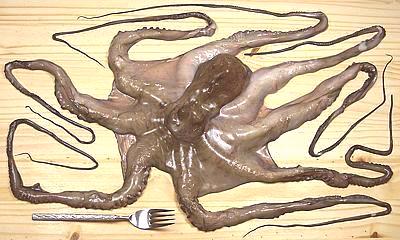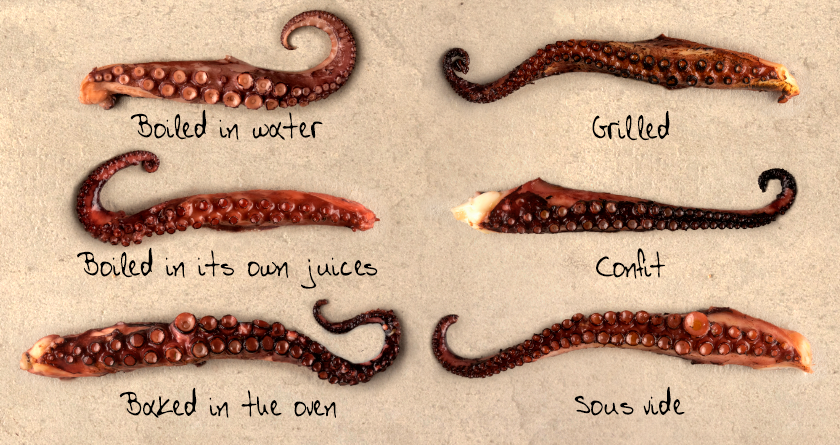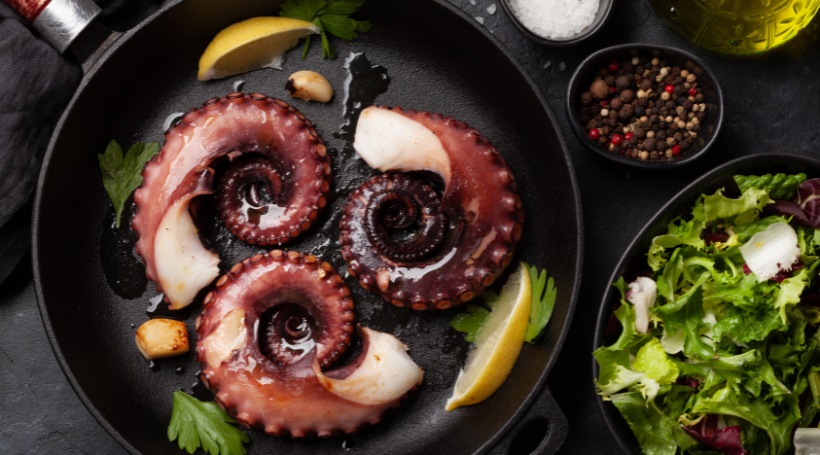Last Updated on January 1, 2025
Octopus shrinks when cooking due to the proteins contracting and the water content evaporating. This results in a firmer texture.
Cooking octopus can be tricky, but understanding why it shrinks helps achieve the best results. Octopus is primarily composed of water and proteins, which react to heat by tightening and expelling moisture. As the proteins contract, the octopus loses volume and becomes denser.
This process is similar to what happens when other seafood or meats are cooked, but it’s more noticeable due to the high water content in octopus. Proper cooking techniques, like slow simmering or quick searing, can help maintain its tenderness and flavor. Knowing these details ensures a more enjoyable dining experience and helps in preparing octopus dishes with confidence.

Octopus Anatomy
Understanding why an octopus shrinks when cooked involves exploring its unique anatomy. The octopus has a fascinating structure. This structure influences how it reacts to heat during cooking. Let’s delve into the details of its muscle composition and connective tissues.
Muscle Composition
Octopus muscles are different from those of land animals. They are rich in collagen. Collagen is a protein that provides structure. It also makes the muscles very elastic and flexible. When you cook an octopus, the heat causes the collagen to contract. This contraction results in the muscles shrinking.
Another factor is the high water content in octopus muscles. When heated, the water evaporates. This further causes the muscles to reduce in size. The combination of collagen contraction and water loss explains the significant shrinkage.
Connective Tissues
Connective tissues play a crucial role in octopus anatomy. These tissues connect muscles and provide support. They are also made of collagen. When exposed to heat, the connective tissues tighten. This tightening adds to the overall shrinkage.
| Component | Effect of Heat |
|---|---|
| Muscle | Collagen contracts, water evaporates |
| Connective Tissues | Collagen tightens |
These anatomical features make octopus unique. They also explain why it shrinks during cooking. Understanding this can help in preparing it correctly. Whether boiling, grilling, or frying, knowing the anatomy is key.
:max_bytes(150000):strip_icc()/squid-and-calamari-cooking-tips-1808815_final-72f2d071118548699582ecd70b71bbb6.png)
Heat’s Impact
Cooking an octopus can be an intriguing culinary experience. One common observation is that an octopus shrinks when cooked. This phenomenon is primarily due to the impact of heat. Let’s delve into the specifics.
Protein Denaturation
Heat causes the proteins in an octopus to denature. This means the proteins lose their natural structure. When the structure changes, the proteins contract. This contraction leads to the octopus shrinking. The process begins at around 140°F (60°C).
When proteins contract, they release moisture. This moisture loss contributes to further shrinkage. The denaturation process is essential for making the octopus tender. Without it, the octopus would remain tough and chewy.
Water Loss
Octopus contains a high amount of water. Cooking leads to water loss, causing the octopus to shrink. The heat evaporates the water content, reducing the size of the octopus.
The water trapped within the cells escapes. This escape happens through the cell walls. The result is a noticeable reduction in the octopus’s size. Water loss also affects the texture. The octopus becomes firmer as it loses water.
| Factor | Impact on Shrinkage |
|---|---|
| Protein Denaturation | Proteins contract and release moisture |
| Water Loss | Evaporation reduces size and firms texture |
Understanding these factors helps in better preparing octopus dishes. Proper cooking techniques can manage the extent of shrinkage. This knowledge ensures the octopus remains tender and flavorful.
Cooking Techniques
Octopus is a culinary delight. Cooking it right ensures it remains tender and flavorful. Different techniques affect its texture. Let’s explore why octopus shrinks during cooking through different methods.
Boiling
Boiling is a common method to cook octopus. The heat causes water inside the octopus to evaporate. This evaporation makes the octopus shrink. Boiling also breaks down proteins, making the meat tender.
To boil octopus:
- Fill a large pot with water.
- Add some salt to the water.
- Bring the water to a boil.
- Submerge the octopus in the boiling water.
- Boil for 40-60 minutes, depending on the size.
Keep checking the octopus for tenderness. Once tender, remove it from the water. This method preserves the flavor and ensures tenderness.
Grilling
Grilling is another popular method. High heat from the grill causes the octopus to shrink. The heat expels moisture and tightens the muscle fibers.
Steps to grill octopus:
- Pre-cook the octopus by boiling it for 30 minutes.
- Let it cool and pat it dry.
- Brush it with olive oil and season with salt.
- Preheat the grill to high.
- Grill the octopus for 3-4 minutes per side.
Grilling adds a smoky flavor. The texture becomes slightly crispy outside while tender inside.
| Cooking Method | Effect on Octopus |
|---|---|
| Boiling | Tenderizes and shrinks due to water loss |
| Grilling | Shrinks due to high heat, adds smoky flavor |
Prevent Shrinkage
Cooking octopus can be tricky. One common issue is shrinkage. This can make your dish look less appealing and affect texture. Let’s explore how to prevent this.
Tenderizing Methods
Tenderizing the octopus helps. It reduces shrinkage during cooking. Here are some popular methods:
- Freezing: Freeze the octopus before cooking. This helps break down tough fibers.
- Beating: Beat the octopus with a mallet. This makes it more tender.
- Marinating: Use acidic marinades. Vinegar or lemon juice are great choices.
Temperature Control
Controlling temperature is crucial. Octopus tends to shrink at high temperatures. Follow these tips:
- Slow Cooking: Cook the octopus slowly. Use a low to medium heat.
- Boiling: Boil the octopus before grilling or frying. This helps maintain its size.
- Steaming: Steaming is a gentle method. It helps retain moisture and size.
By following these methods, you can enjoy tender, juicy octopus. Happy cooking!
Culinary Insights
Cooking octopus can be a fascinating experience. It shrinks significantly during the process. This change involves texture and flavor aspects. Let’s dive deeper into these culinary insights.
Texture Preferences
Octopus is rich in muscle fibers. These fibers contract when heat is applied. This contraction causes the octopus to shrink. Chefs and home cooks often prefer a tender texture. Cooking techniques like boiling or braising help achieve this. Slow cooking keeps the octopus tender. Quick cooking methods make it rubbery.
Flavor Enhancements
Shrinking concentrates the flavors of the octopus. The juices are retained within the meat. This results in a richer taste. Marinating the octopus before cooking enhances its flavor. Common marinades include lemon, olive oil, and garlic. These ingredients seep into the meat, giving it a delightful taste.
| Cooking Method | Texture Outcome | Flavor Outcome |
|---|---|---|
| Boiling | Tender | Mild |
| Grilling | Chewy | Smoky |
| Braising | Soft | Rich |
Cooking octopus is both an art and a science. Understanding why it shrinks adds to the culinary joy. Experiment with different methods to find your favorite texture and flavor.

Frequently Asked Questions
Why Does Octopus Shrink When Cooked?
Octopus shrinks due to protein contraction when exposed to heat. The moisture also evaporates, causing it to reduce in size.
How To Prevent Octopus From Shrinking?
To minimize shrinkage, tenderize the octopus before cooking. You can also cook it slowly at low temperatures.
Is Shrinking Of Octopus Normal?
Yes, it’s normal for octopus to shrink during cooking. Heat causes proteins to contract, making it smaller.
Does Freezing Affect Octopus Size?
Freezing doesn’t significantly affect size. It helps tenderize the meat, which can reduce shrinkage during cooking.
What Is The Best Way To Cook Octopus?
Boiling or simmering octopus slowly is ideal. This method helps retain moisture and reduces excessive shrinkage.
Conclusion
Cooking causes an octopus to shrink due to the proteins contracting. Understanding this helps achieve the perfect texture. Remember to cook it gently. Enjoy your tender, delicious octopus dish with confidence.

